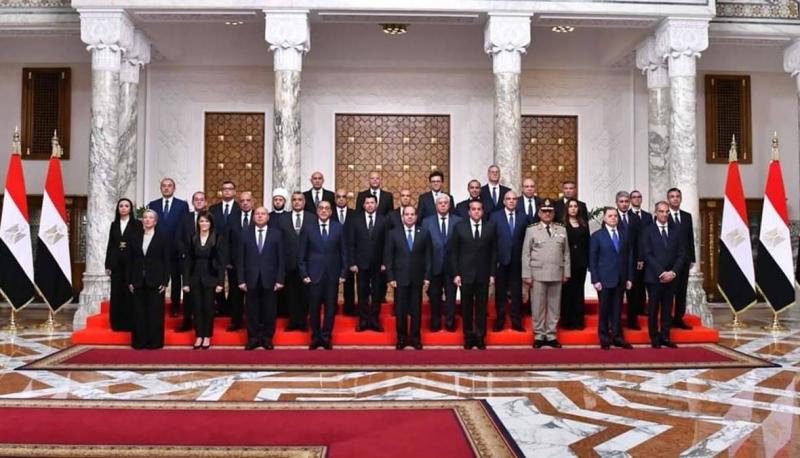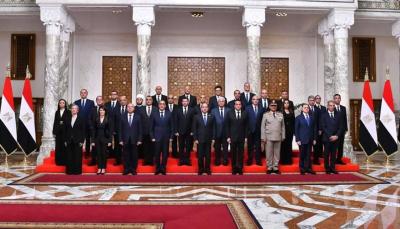The cabinet reshuffle in Egypt has raised questions among many Egyptians about the work program of Prime Minister Mostafa Madbouly’s new government in light of current challenges, particularly external ones, amid numerous regional and international crises impacting the nation. This comes at a time when demands are rising for a significant breakthrough in economic issues. The new government took the oath of office before Egyptian President Abdel Fattah El-Sisi today, Wednesday, July 3, 2024, a month after the resignation of Madbouly's previous cabinet.
In appointing Madbouly to form a new government in June, El-Sisi set several objectives, foremost among them the need to maintain the determinants of Egyptian national security in light of regional and international challenges, continue efforts to develop political participation and address security and stability issues, and combat terrorism, while enhancing the accomplishments in these areas, alongside advancing cultural awareness.
To address security and foreign affairs, El-Sisi promoted Major General Abdul-Majid Saqr to the rank of full general and appointed him Minister of Defense and Military Production, replacing the previous minister, Mohamed Zaki. Meanwhile, Ambassador Badr Abdel-Aty was appointed as Minister of Foreign Affairs and Immigration, succeeding former minister Sameh Shoukry.
The Egyptian Center for Thought and Studies noted that national security is the top challenge facing the new government, as Cairo remains committed to safeguarding its national security amid regional and international challenges, with a strong focus on combating terrorism and ensuring stability. In a study published today, the center stated that the new government would continue to engage with the topics that the previous cabinet was involved in, with the latest being the Gaza War, where Egypt played a pivotal role as a trusted party in negotiations between all sides through its diplomatic mechanisms and concerned state agencies.
What can the government offer?
In a statement to the press, the head of the Defense and National Security Committee in the Egyptian House of Representatives, Lieutenant General Ahmed Al-Awadhi, stated that preserving Egyptian national security will be a top priority for the new government, emphasizing that “state efforts are focused in this direction, and this is a major responsibility." Al-Awadhi revealed that Mostafa Madbouly will present the new government's statement and program to Parliament next Monday, at which point he will detail the various axes of government work, including national security and external issues.
He underscored that the government and Egyptian institutions are making extensive efforts to address current regional crises, especially regarding the situation in Gaza, where Cairo is intensifying efforts to reach a truce to save Palestinian lives, while striving hard to stop the ongoing fighting in Sudan. However, Al-Awadhi added that internal challenges will be fully present in the new government's work, particularly the "focus on building the Egyptian person in terms of health and education, improving economic performance, and achieving social justice."
Confronting Regional Crises
In this context, member of the Egyptian Council for Foreign Affairs and former Assistant Foreign Minister Ambassador Rakhia Ahmed Hassan noted that the new Foreign Minister Badr Abdel-Aty will face the same challenges that Shoukry dealt with; especially as Egypt is surrounded by a series of raging crises "in the south with Sudan, in the west with the Libyan division, and in the east with Gaza and the West Bank."
What do Egyptians expect from the new government?
Hassan emphasized that these complex crises require efforts to continue finding solutions with Arab and international parties. He pointed out that the new Foreign Minister will start working on these issues promptly, especially with Cairo hosting a conference for Sudanese political and civil forces on July 6, hoping it would be the beginning of a resolution to the Sudanese crisis instead of the current stagnation.
Regarding the war in Gaza, the Egyptian diplomat explained that "there is stagnation in efforts to reach a ceasefire, and we hope for a breakthrough in Israeli obstinacy."
In another matter, Hassan mentioned that the Foreign Minister will work to enhance cooperation with international financial institutions in collaboration with the economic group to secure investments and favorable loans, thereby participating in addressing internal challenges, especially the current economic situation. Cooperation with the European Union to tackle illegal immigration crises will also be prominent during the tenure of the new Foreign Minister, according to Hassan, who described him as "active and capable of swift action, and we hope for breakthroughs in all crises."




